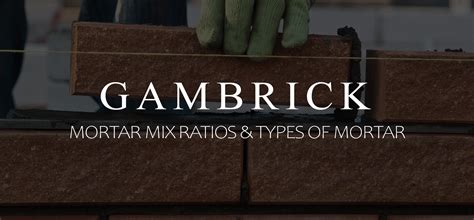Mortar mixes are an essential component in various construction projects, serving as the binding agent that holds bricks, stones, and other masonry materials together. With so many types of mortar mixes available, choosing the right one for your next project can be overwhelming. In this article, we will explore six common types of mortar mixes, their characteristics, and the projects they are best suited for.
Understanding Mortar Mixes
Before we dive into the different types of mortar mixes, it's essential to understand what mortar is and how it's made. Mortar is a mixture of cement, water, and sand, which is applied between masonry units to hold them together. The proportions of these ingredients can vary depending on the type of mortar mix and the intended use.

Type 1: Ordinary Portland Cement (OPC) Mortar Mix
OPC mortar mix is the most common type of mortar mix used in construction projects. It's made from a mixture of ordinary Portland cement, sand, and water. This type of mortar mix is suitable for general masonry work, such as building walls, laying bricks, and repairing concrete structures.
Characteristics:
- Compressive strength: 100-200 psi
- Flexural strength: 50-100 psi
- Durability: Good
- Cost: Economical
Type 2: Sulfate-Resistant Cement (SRC) Mortar Mix
SRC mortar mix is similar to OPC mortar mix but is made with sulfate-resistant cement. This type of mortar mix is designed to withstand exposure to sulfate-rich environments, such as seawater or soil with high sulfate content. SRC mortar mix is ideal for construction projects near coastal areas or in regions with high sulfate levels.

Characteristics:
- Compressive strength: 150-300 psi
- Flexural strength: 75-150 psi
- Durability: Excellent
- Cost: Moderate
Type 3: High-Strength Mortar Mix
High-strength mortar mix is designed for projects that require high compressive strength, such as high-rise buildings or heavy-duty construction. This type of mortar mix is made with a special blend of cement, sand, and admixtures that enhance its strength and durability.
Characteristics:
- Compressive strength: 300-500 psi
- Flexural strength: 150-300 psi
- Durability: Excellent
- Cost: High
Type 4: Acrylic Mortar Mix
Acrylic mortar mix is a specialized type of mortar mix that contains acrylic polymers. These polymers enhance the mortar's flexibility, adhesion, and water resistance, making it ideal for projects that require high flexibility and durability, such as flooring and tile installations.

Characteristics:
- Compressive strength: 100-200 psi
- Flexural strength: 50-100 psi
- Durability: Excellent
- Cost: Moderate
Type 5: Epoxy Mortar Mix
Epoxy mortar mix is a two-component mortar mix that consists of an epoxy resin and a hardener. This type of mortar mix is known for its high strength, durability, and resistance to chemicals and abrasion. Epoxy mortar mix is ideal for projects that require high performance, such as industrial flooring and repairs.
Characteristics:
- Compressive strength: 500-1000 psi
- Flexural strength: 300-500 psi
- Durability: Excellent
- Cost: High
Type 6: Lime-Based Mortar Mix
Lime-based mortar mix is a traditional type of mortar mix that uses lime as the primary binding agent. This type of mortar mix is known for its breathability, flexibility, and durability. Lime-based mortar mix is ideal for historic restoration projects, as well as projects that require a high level of breathability, such as brick and stone masonry.

Characteristics:
- Compressive strength: 50-100 psi
- Flexural strength: 25-50 psi
- Durability: Good
- Cost: Moderate
Choosing the Right Mortar Mix for Your Project
With so many types of mortar mixes available, choosing the right one for your project can be overwhelming. When selecting a mortar mix, consider the following factors:
- Compressive strength: What level of strength is required for your project?
- Durability: What level of durability is required for your project?
- Cost: What is your budget for the project?
- Environmental conditions: What environmental conditions will the mortar be exposed to?
By considering these factors, you can choose the right mortar mix for your project and ensure a successful outcome.






What is the difference between OPC and SRC mortar mix?
+OPC mortar mix is made with ordinary Portland cement, while SRC mortar mix is made with sulfate-resistant cement. SRC mortar mix is more durable and resistant to sulfate-rich environments.
What is the best mortar mix for brick laying?
+The best mortar mix for brick laying depends on the type of brick and the environmental conditions. However, OPC mortar mix is a popular choice for brick laying due to its good compressive strength and durability.
Can I use lime-based mortar mix for modern construction projects?
+Lime-based mortar mix is suitable for historic restoration projects, but it may not be the best choice for modern construction projects that require high compressive strength and durability. However, it can be used for projects that require high breathability and flexibility.
We hope this article has provided you with valuable information on the different types of mortar mixes available. By choosing the right mortar mix for your project, you can ensure a successful outcome and a durable structure that will last for years to come.
